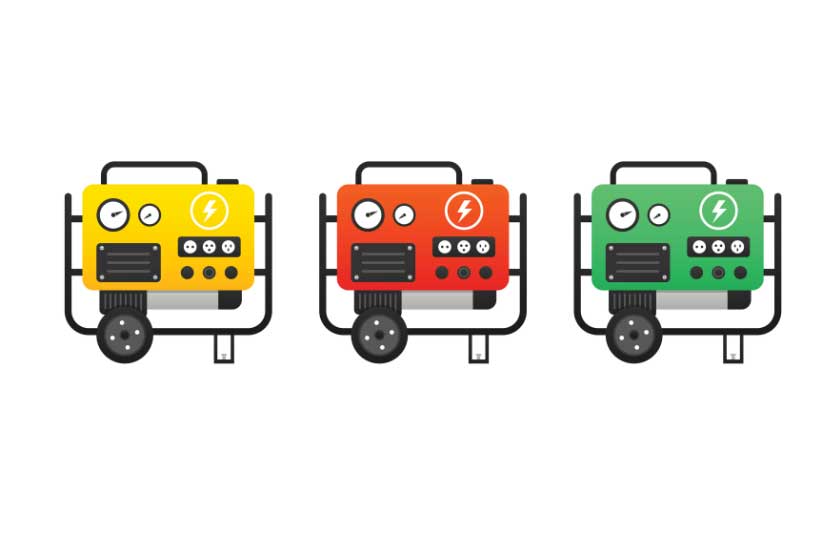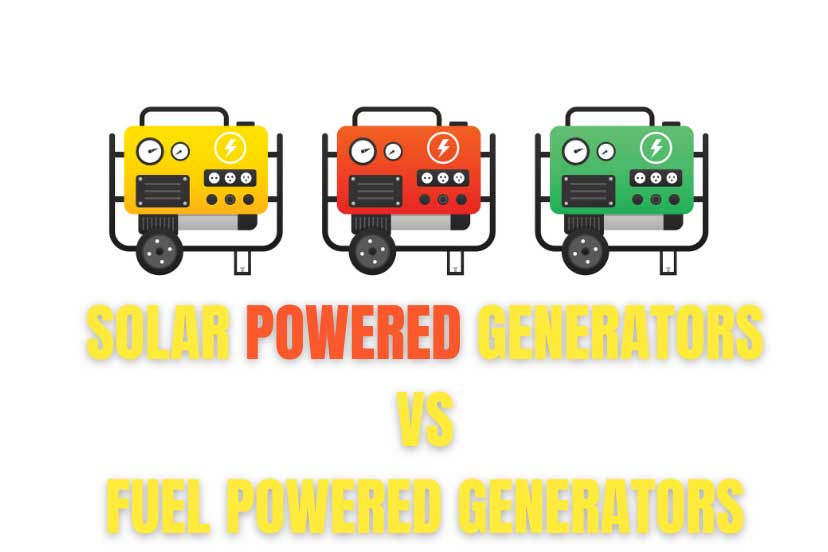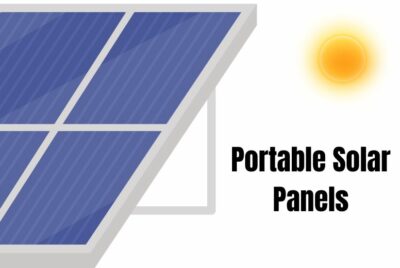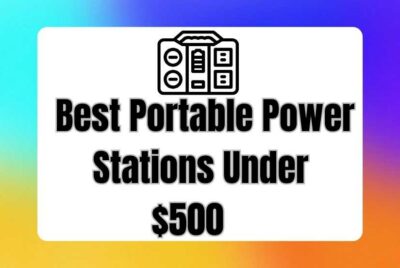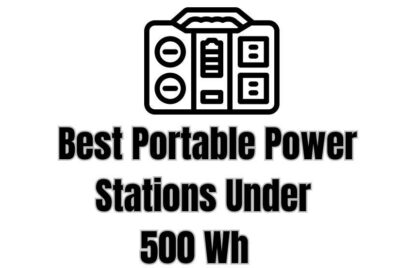The Power Showdown: Solar Battery Generators vs. Traditional Fuel-Operated Generators for Home Backup
I may earn a commission for purchases made through my links. It helps me run this site. Check out my disclosure for more details.
Who wants to sit in the dark next time the power goes out? It’s nice to be prepared and have an automatic home power back up when the grid goes down. You have two choices for back up power, solar battery generators or traditional gas, diesel or propane generators. Solar panels won’t power your home when the power shuts out unless you have a battery storage system.
Solar battery powered systems have become a popular alternative to traditional fuel-operated generators, but how do they compare? Let’s take a closer look.
Fuel Based Generators
Pros
- Powerful and Consistent: Diesel and propane generators can provide a large amount of power and operate reliably, regardless of weather conditions.
- Rapid Response: They can start producing power almost instantly after a power outage, which is a significant advantage in emergency situations.
- Price: Can cost less up front
Cons
- Environmental Impact: Fuel-based generators emit greenhouse gases and cannot be used indoors
- Noise and Maintenance: These generators can be quite noisy and require regular maintenance and fueling.
- Fuel Costs and Availability: The ongoing fuel costs can add up, and fuel availability can be an issue during disasters.
Regular diesel and propane generators are reliable and efficient, but they come with some downsides. Firstly, they require fuel to operate, which can be costly and polluting. If they run out and you are out of fuel you will be in another power outage again.
Secondly, they can be noisy and disruptive to the environment. You also need to give them some regular maintenance to keep them running smoothly. But, one thing they have going for them is that they are cheaper to buy on the front end.
Solar Battery Generators
Pros
- Renewable and Clean Energy: Solar power captures energy directly from the sun, making it a renewable and free energy source.
- Maintenance and Noise: Solar generators require minimal maintenance compared to their fuel-based counterparts and operate quietly, contributing to a more peaceful environment.
- Expansibility: They are flexible and scalable. Adding more solar panels or battery storage allows for increased capacity.
- Price: Can be cheaper in the long run and can add money back in your pocket with tax incentives or lessen your bills if you plug yours directly into your electrical circuits.
Cons
- Dependence on Weather: The effectiveness of solar power generation is contingent upon sunlight, making it less reliable in areas with limited sunlight or during times of extended cloud cover.
- Upfront Costs: While costs are decreasing, the initial investment for a solar power system can still be significant, particularly if you need a large amount of storage capacity.
- Space: Large solar installations require a considerable amount of space for panels.
In contrast, solar battery generator systems use solar panels to convert sunlight into energy, which is stored in batteries for later use. They are quiet, clean, and require little maintenance. While the upfront costs of a solar power system can be higher than a traditional generator, the long-term savings on fuel costs make them a more cost-effective option.
When it comes to sizing, regular generators are typically measured in kilowatts (kW), while solar power systems are measured in kilowatt-hours (kWh). A typical home may require 25-30 kWh per day to run, depending on its size and energy needs. It’s important to note that solar power systems can be expanded like the EcoFlow Delta Pro series to meet the energy needs of a home, while traditional generators may have limitations.
Solar Batteries vs Fuel Generators
In a quick head-to head, fuel based generators need regular maintenance checks and of course they do require fuel to be topped up when you are using them. They produce more noise than solar powered generators, and also emit fumes. Both types of generators can act as home back up generators, but a gas generator will shut off when it runs out of fuel. Solar generators will cut off if they battery is depleted, but in essence once you have paid for your rig (panels, connectors, battery storage), the energy is free. As long as you have sun of course, or access to a car port for charging.
Solar batteries are convenient in that they can be charged by 3 methods
- Solar Panels
- Car Ports
- AC Power
Though AC is a fat lot of good when there is an unplanned outage. But if you know a storm is coming and your battery is not 100% charged, or, if you have several batteries or solar generators for your home, you can top them up fast with AC charging to see you through the power lag. Solar generators can also be charged by other solar generators and traditional generators, if your model allows for this.
Safety Profiles
Both types of generators are safely if handled properly and operately in the correct environment. You cannot use a gas generator indoor as the risk of poisoning from toxic fumes and the fire hazards are high. Solar generators can be stored indoors, and they are compact and can also be transported easily so you can take them on your next RV getaway, or take them when you are going camping or are doing some type of outdoors work that needs an off-grid power supply.
Frequently Asked Questions
Here are some frequently asked questions about solar power systems vs. traditional generators.
How long do solar panels last? Solar panels can last up to 25-30 years with proper maintenance.
How much does a complete home solar power system cost? A complete home solar power system can range anywhere from $10,000 to $30,000 or more depending on the size and complexity of the installation.
Can solar power systems be used during a power outage? Yes, solar power systems can be used during a power outage if they are equipped with battery storage.
Can solar panels work in cloudy weather? Yes, solar panels can still generate energy in cloudy weather, although their efficiency may be reduced.
How long do batteries last in a solar power system? High-strength LiFeP04 Batteries in a solar power system should last up to 10-15 years with proper maintenance. They start to degrade over time and are rated in cycles. The higher the cycle life, the longer the battery will last before it starts to degrade.
How loud are traditional generators? Traditional generators can be quite loud, ranging from 60-90 decibels.
How loud are solar generators? High powered 3000W solar generators and above can run at 45-60 decibels.
How often do traditional generators need to be serviced? Traditional generators require regular maintenance, including oil changes and filter replacements, every 100 hours of use or annually.
How much fuel do traditional generators consume? The fuel consumption of traditional generators can vary depending on their size and usage, but they can consume up to 1-2 gallons of fuel per hour.
Can traditional generators be used indoors? No, traditional generators should not be used indoors due to the risk of carbon monoxide poisoning.
Are solar power systems eligible for tax credits or incentives? Yes, solar power systems are eligible for federal tax credits and some state incentives.
Round Up
While traditional fuel-operated generators have their place, especially in situations requiring instant, high-output power, the trend is clearly shifting towards solar battery generators. Their renewable nature, low maintenance, and the ability to scale make them an enticing option. Yes, the upfront costs are significant, but the long-term benefits and potential savings make this a worthy investment. When we factor in the environmental implications, the choice becomes even more clear.
Embracing solar energy is not only an investment in our homes but also in our planet. As we strive for a greener future, the adoption of solar power systems plays a critical role. While traditional fuel-operated generators may still hold relevance in specific scenarios, the dawn of solar energy is here to stay.
Admittedly, it’s not a one-size-fits-all solution. Certain geographical or financial constraints might still make diesel or propane generators a more viable option for some. But with technological advancements and decreasing costs, solar power systems are becoming increasingly more attractive.
Ultimately, the choice between solar and traditional generators should be dictated by your specific power needs, budget, and location. In an energy showdown, the solar battery generator emerges as a strong contender, proving that, just like the sun, it’s a power to reckon with!
